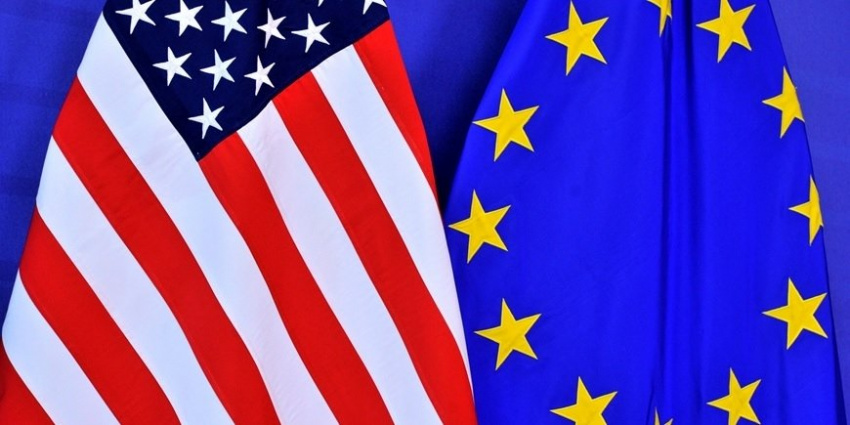Trump’s Campaign against Europe

By: Hanif Ghaffari
Over the past few days, there has been news about the specific talks between the President of the United States and some of the European Union’s member states. Trump called on French President Emmanuel Macron to leave the European Union and thus build wider bilateral relations with the United States. On the other hand, Trump has officially asked the British Prime Minister Theresa May to sue the European Union rather than interacting with it. These are indications of the wide and extensive opposition of the United States to the United Europe. This confrontation can become a full-fledged dispute in the future. However, the European Union has not yet made a firm response to the United States, and it has adopted a policy of "having interactions with Tramp," but this policy can’t be adopted for a long time.
Regarding this newly raised dispute, there are some points that can’t be easily ignored. Firstly, the European officials haven’t yet understood the extent of Trump’s hostility to the existence of the United European. This is while the trade war between Trump and the European Union has entered a new phase since the beginning of 2018. Some American economic analysts believe that based on his protectionist policies, Trump will impose new and wider tariffs on the EU, China, Canada and Mexico in the future. European officials are now faced with a president who sees "economic protectionism" as a major policy in the field of commerce, and in the future he will try to pursue this policy even more seriously.
Undoubtedly, there will soon be more economic disputes between America and Europe. In other words, the Trade war between these two will become more intense in near future. Furthermore, countries like China and Canada will also enter this confrontation with the United States. At their most recent meeting, European officials argued that they have the right to respond to Trump's actions. However, some European authorities, including Theresa May, believed that amid the existing disagreements raised between Brussels and Washington, EU leaders should attempt to negotiate and hold talks with Trump. Obviously, the British Prime Minister's views can’t be accepted by other European players, and that’s because now Britain is on the brink of leaving the European Union, and this country has now become a symbol of inconsistency in this block.
The next point here is about Trump’s presidential campaign slogans and his approach to the European Union. In the course of the 2016 presidential elections in the United States, Trump had expressed his opposition to the "existence of the United Europe." Trump's particular support for Brexit and beyond that, his support for nationalist and far-right extremists in European countries, indicated the full opposition of the US President with the European Union and the Eurozone. The evidences suggest that the relations between Trump and the nationalist groups and the opponents of the United Europe remain strong. Thus, the conflict between the White House and the United Europe is a kind of fundamental conflict, one that will continue until the collapse of the United Europe or the end of Trump’s time at the White House. Trump publically calls for the destruction of the United Europe, and he doesn’t hesitate to express this opposition to this block. On the one hand, he intends to support the nationalist and anti-EU alliances, which will pave the way for the economic weakening of Europe, and, on the other hand, he’s after increasing the security costs of Europe under the North Atlantic Treaty Organization. Thus we can see that there’s a full consistency between US economic and security policies.
Another point to be taken into consideration is about the specific approach taken by the European officials towards the US government and the president of this country. Europeans simply compromise with Donald Trump. This is while such an approach hadn’t been to their benefit so far. Ironically, it made Trump and his government even more motivated in this regard. The recent suggestion by the US president to Emmanuel Macron well indicates this fact.
EU member states, under the policies of politicians such as Theresa May, Emmanuel Macron, and even German Chancellor “Angela Merkel, have not yet used their capacities to confront the Trump’s government's actions and policies. It has reached a point where the British prime minister has asked other European countries to be silent against Washington regarding the imposition of tariffs on steel and aluminum imported from Europe.
Finally, it should be noted that Trump doesn’t basically follow the confrontation with the United Europe in the form of a "hidden strategy", but he explicitly declares it publically and before the media. This reflects the serious conflict between Washington and the European Union during the presidency of Donald Trump. But it seems that the EU and the Eurozone officials do not understand this simple truth, or maybe they intentionally close their eyes on it. Undoubtedly, this could bring economic, political and even hard security shocks to Europe in the future. Hence, Europe needs to get out of the phase of interacting with Trump as soon as possible, and take the policy of confronting with the President of the United States.
If the European Union delays in this regard and continue to be optimistic about its future relations with Washington, it will face repeated and synchronous security and economic tensions, which, of course, dealing those will be beyond the power of the European officials.
Source: Mehr News

